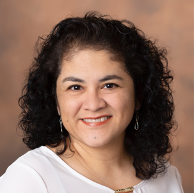for Webflow

As a first-generation college student, Patricia “Patty” Buenrostro attended the University of Illinois at Urbana-Champaign, earning a B.S. in Mechanical Engineering. Looking for a way to return and give back to her community, she decided to teach at a second-chance high school working with pushed out youth; she fell in love with teaching and working alongside youth. Following, Patty served as a high school mathematics teacher and coach in Chicago for over 20 years in working-class Latiné and African American communities. In 2001, she was part of a historic grassroots-led struggle that included a 19-day hunger strike for educational justice in her working class, mostly Mexican-immigrant community of La Villita. This collective community effort led to the founding of the Little Village Lawndale High School (LVLHS). She then went on to earn a PhD from the University of Illinois at Chicago in Curriculum Studies and was part of the Center for Mathematics Education of Latinos (CEMELA), where she worked in collaboration with LVLHS staff and administration to support critical mathematics education and assessment for learning efforts. After receiving her doctorate, she worked as a research fellow at Vanderbilt's Peabody College of Education. Here she worked with Project SIGMa where she focused on supporting mid-career urban mathematics teachers’ engagement with inquiry-based mathematics. Patty worked at Lake Forest College for five years as their secondary education faculty prior to her current role as an Assistant Professor of Mathematics Education at the University of Illinois at Chicago. She is a member of the Sustainable Community Schools Task Force, a joint collaboration for reviving and transforming divested Black and Brown neighborhood schools in Chicago. In this role, she collaborates to support and advance schools' development of critical-culturally relevant pedagogy, restorative justice practices, and authentic parent and community engagement.
Dr. Patty Buenrostro has spent 30+ years collaborating to create counter-cultural spaces that support Black and Latiné youth's positive academic, cultural and socio-political identities shaping her research interests: student-teacher relationality, culturally-sustaining and community-based pedagogies, and justice-oriented curriculum design. In her dissertation, entitled Humanizing Mathematics: Students’ Perspectives on Learning Math for Social Justice, she reported on students’ retrospective meanings in using mathematics as a disciplinary lens to unpack socio-political issues impacting their communities such as voter disenfranchisement and neighborhood displacement. She has published in high-ranking education-focused journals such as Cognition & Instruction, High School Journal, and Educational Studies in Mathematics. Through her research, Patty uplifts the power of centering students’ assets and lived experiences and connecting mathematics as a useful tool in interpreting and transforming the world. As a 30+ year pedagogue, her students have consistently commented on her commitment to care, love, and educational justice. Patty is proud to be a role model for first-generation college students and for Latinas. In the area of mathematics instruction, Patty has implemented, trained teachers, and been a champion of inquiry-based mathematics. She has taught elementary math methods to preservice teachers at four institutions and brings a wealth of knowledge and experience in creating a classroom culture replete with student-to-student mathematical discourse and developing students conceptual understanding and reasoning skills. Her favorite complement has always been when students complain about their head hurting from so much thinking. In preparing future elementary teachers of mathematics, she aims to model a collaborative and mathematically rigorous classroom culture. In the area of service, Patty has worked with the Sustainable Community Schools (SCS) as a task force member, as a member of the professional learning subcommittee, and most recently, supporting authentic parent and community engagement. This service is most endearing to her because it supports the revival and transformation of under-resourced Black and Brown neighborhood schools. At a moment, when these communities are under vitriol attack, SCS serves as a national, community-based model that embodies self-determination and restorative justice. This movement was born out of two notable hunger strikes of which Patty participated in one. Patty serves the mathematics research community as well, serving on two AERA (American Educational Research Association) Special Interest Groups: Research in Mathematics Education (as Awards Chair) and Socio-political Issues in Mathematics and Science Education (as Secretary/Treasurer). In this role she supports ongoing research contributions at the annual AERA conference that hosts on average 15,000 attendees.
“Hispanic Heritage Month represents the opportunity to celebrate the innumerate contributions made by Latiné people and communities. It is time to recognize and uplift the shared sacrifices, struggles, and forms of resistance that Latiné people have and continue to experience and lead. Lastly, it is an opportunity to showcase the diversity and dynamism of the Latiné community as they are everchanging to meet the current challenges and opportunities to fight for racial, economic, and political justice.”